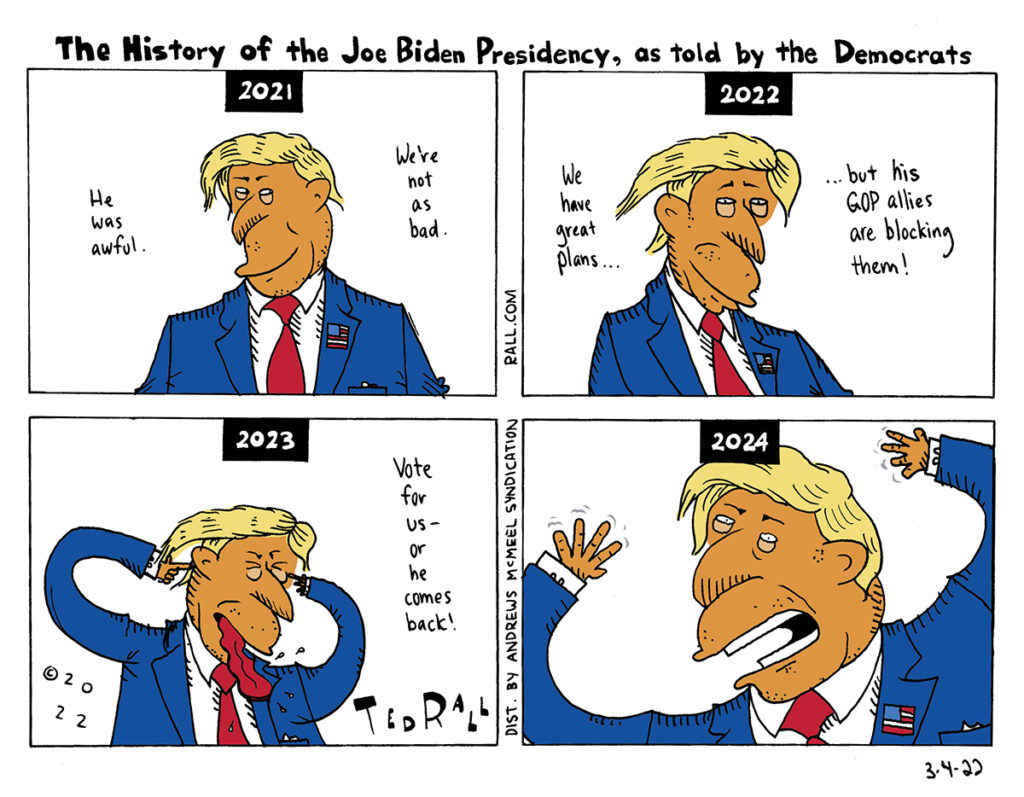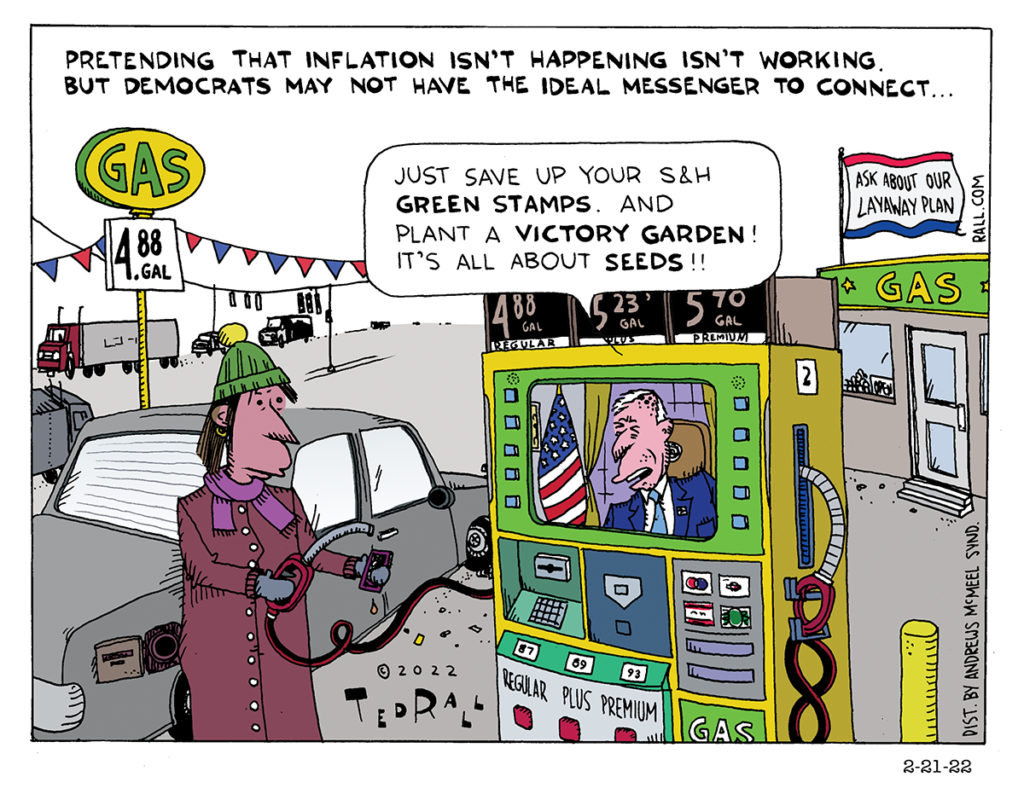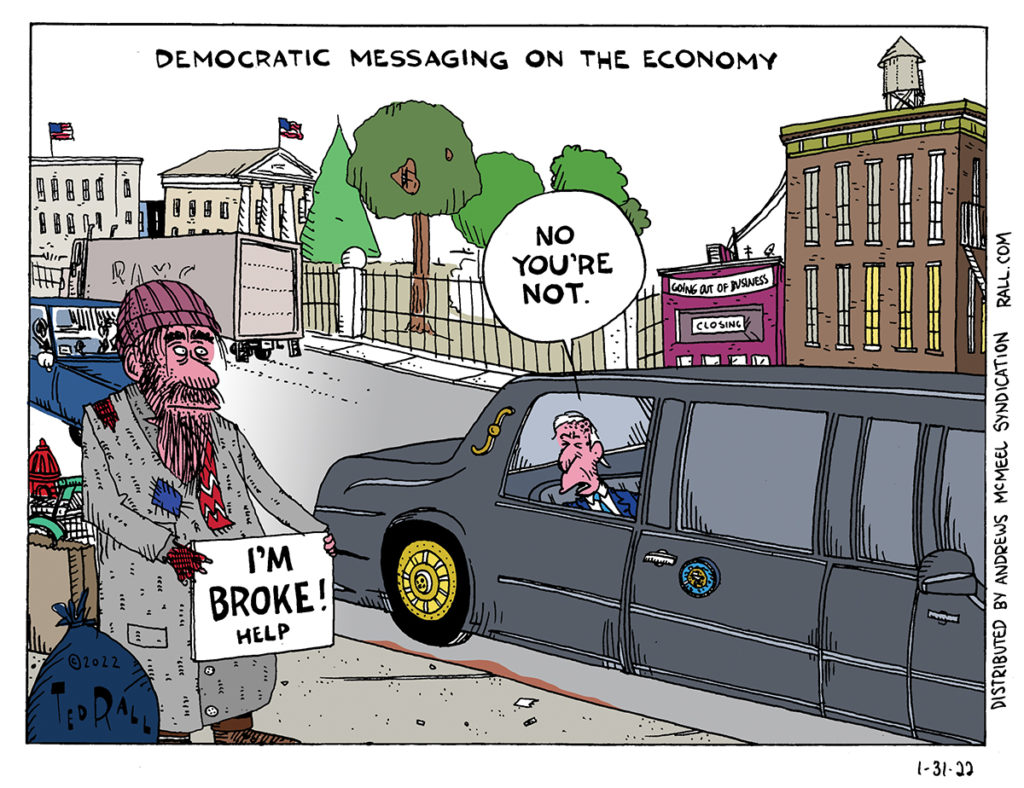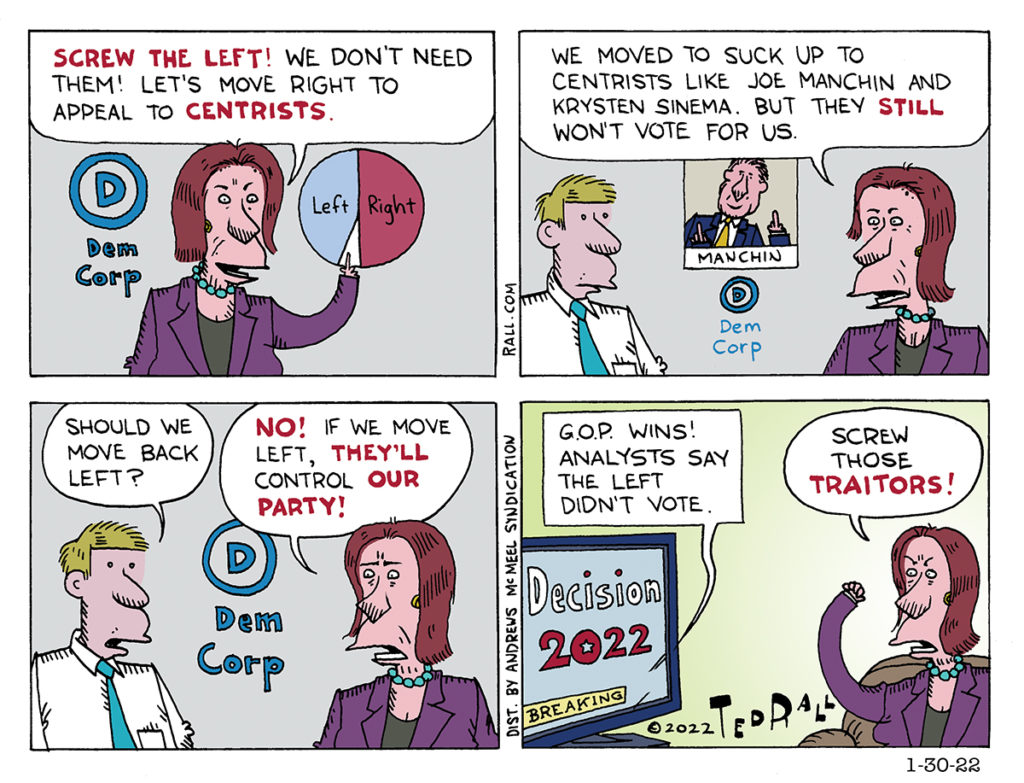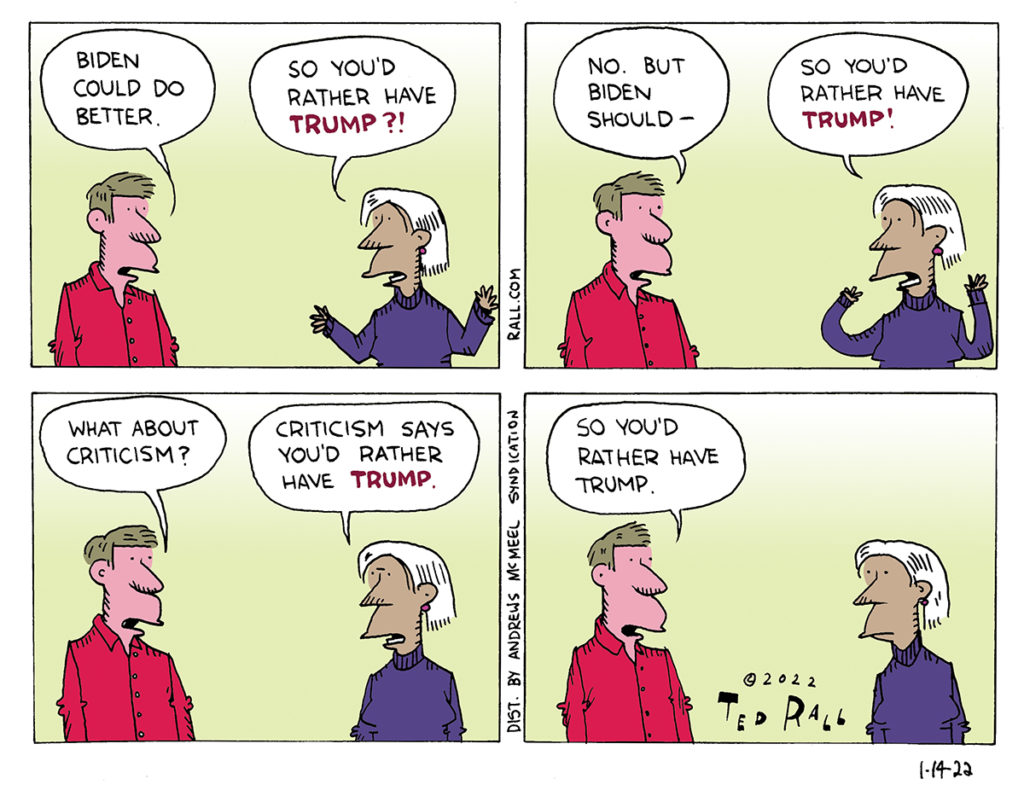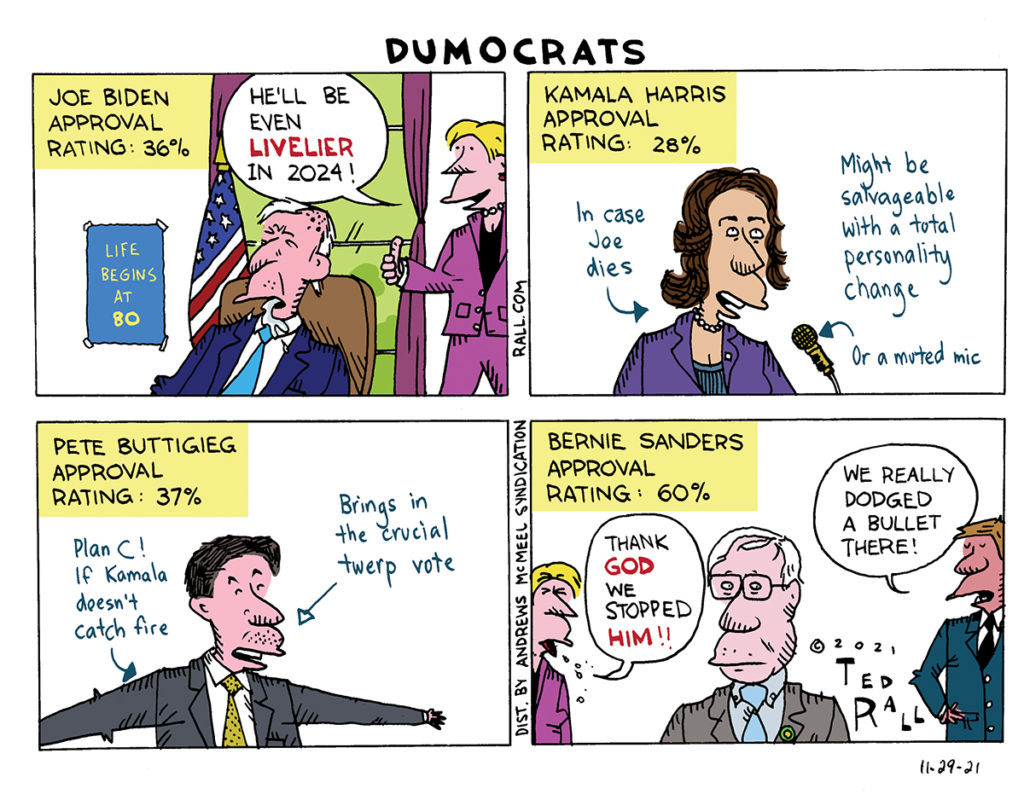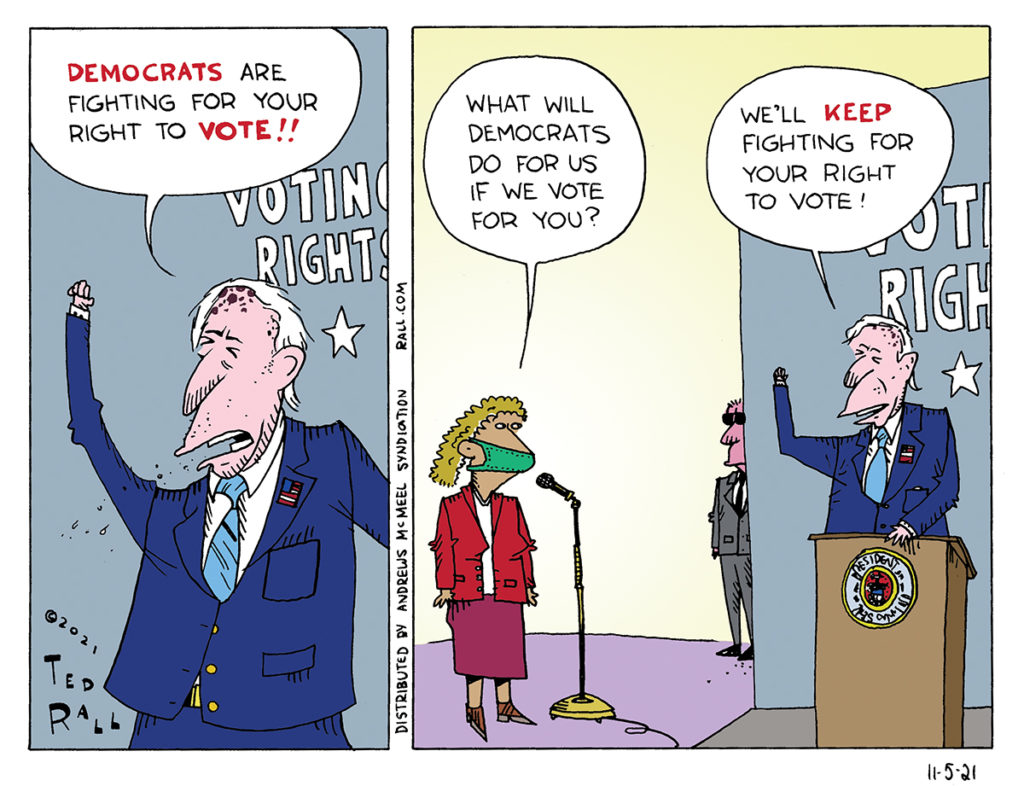The dumbest thing you can do in politics is to fall into the framing of the opposite party. But that’s exactly what the Democrats are doing by constantly comparing President Joe Biden and congressional Democrats to former President Donald Trump and his allies.
Somewhat Less Than Ideal Messenger
Democrats are facing tough polling numbers going into the 2022 midterm elections, in large part because of inflation. They should probably get someone to say something, maybe Joe Biden, but that doesn’t seem like a viable prospect.
Democratic Messaging on the Economy
It must be frustrating for President Biden to try to convince Americans that they are doing better than they feel they are doing. After all, the stock market is doing well, there is strong job growth and it’s easy to get a raise. But people are really obsessed about inflation and nothing Democrats say is going to change their minds.
How Liberals Censor Leftists

Just a few decades ago it was still possible for the left to find space on corporate-owned airwaves. Progressive talkers like Tom Leykis, Lynn Samuels and Phil Donahue found wide audiences until they got pushed off the air by the corporate powers that be. I worked talk radio in Los Angeles and San Francisco until 2007.
The same applies to print. Until the 1990s the New York Times occasionally found space for the occasional progressive-minded op-ed; no more, not ever. A memorable turning point was former columnist Bob Herbert’s 2010 remembrance of radical historian Howard Zinn. Zinn’s passing, Herbert wrote about his friend, “should have drawn much more attention from a press corps that spends an inordinate amount of its time obsessing idiotically over the likes of Tiger Woods and John Edwards.” I was surprised that Zinn was friends with a prominent writer at the Times. The paper, Herbert included, rarely if ever mentioned him.
Between the warmongering and essays by torture apologists, there wasn’t space.
It’s their outlet so it’s their rules. They don’t have to broadcast or publish anyone or anything they don’t like. Problem is, they don’t want anyone else to broadcast or publish anyone or anything they don’t like.
There are many shades of Republicanism but, for all the headline-grabbing scuffles between Liz Cheney and Donald Trump, the Republican Party remains a big tent embodied by the range of speakers at CPAC. Big-business Republicans like Mitch McConnell and small-government libertarian Republicans like Rand Paul refrain from criticizing the GOP’s allies on the far right, including white nationalists and other extremists whose ideas capture the imaginations of the rank-and-file, and whose raw numbers they need to win elections.
When an insurgent candidacy gathers momentum from outside the establishment, GOP leaders bow to the will of their voters, as when the California state party did— to the corporatists’ initial displeasure — when actor Arnold Schwarzenegger emerged as the frontrunner in a state gubernatorial recall election. Of course, national officials have fallen in line behind Trump.
Top Democrats, on the other hand, would rather lose elections than yield control to their party’s progressive base. They deployed sleazy but legal tactics, as well as Nixon-style dirty tricks, to block Bernie Sanders in consecutive sets of primaries even though polls consistently showed him to be the strongest candidate while their chosen nominee, Hillary Clinton, lost. Sanders remains one of the most popular politicians in America yet party leaders and their media allies are still congratulating themselves for stopping him as they scramble for a viable presidential candidate for 2024: Joe Biden (going senile, approval rating 36%), Kamala Harris (unlikable, 26%) or maybe Pete Buttigieg (wet behind the ears, 37%).
Democrats want progressive votes but only for free, nothing owed, and then on sufferance. One of the main ways party leaders announce their contempt for progressives is to demonize and marginalize progressive pundits and commentators. While their framing often falls flat and they’re weak in negotiations with Republicans, the Democrats’ censorship of the left is ruthless and cunning.
Democrats represent half the country and progressives represent half the Democrats. In other words, progressive Bernie Sanders/Elizabeth Warren/Squad voters account for roughly a quarter of the electorate. But these one out of four voters have only token representation among politicians and zero representation in mainstream media.
Anti-progressive censorship is so thorough that we had might as well be living in the Soviet Union. In the 2016 presidential primaries, only two major newspapers endorsed Sanders. None did in 2020. Sanders was blacklisted by cable news; MSNBC’s strict no-Bernie-coverage rule even led to the firing of a host, the late Ed Schultz. No major daily newspaper in the United States employs a progressive or other leftist on staff as an opinion columnist or editorial cartoonist—while hundreds of mainstream liberals and conservatives ply their trade.
Reveling in brazen hypocrisy, corporate Democrats censor progressives and other leftists who criticize them from their left flank—then they discredit them using a fiendish tactic: guilt by forced association.
Since it’s impossible for a left-of-the-Democrats talk host to find work on either terrestrial or satellite radio or television, some manage to turn up either on foreign-owned or conservative media outlets that welcome criticism of the Democratic Party even if it comes from the left. And when they do, lefties get smacked down for the sin of trying to earn a living.
During the Bush years, English-language services of the Qatari-owned Al Jazeera website and cable TV provided a haven for Bush-bashers like yours truly, who by then had earned persona non grata status at places like CNN and MSNBC. Now Russia’s RT and Sputnik News employ a roster of progressives exiled from the walled garden of mainstream media.
Having thoroughly silenced every progressive voice, Democrats and their media allies resort to absurd victim-blaming: how, they ask, dare they work for foreigners? Especially foreigners who aren’t aligned with the U.S. government?
Conservative news outlets like The Wall Street Journal, Fox News and the New York Post give more space to progressives than do “liberal” media. The “enemy of my enemy” motivation is at work; if the left wants to beat up Democrats, who is the right to refuse? As a former frequent guest on Fox News, I took heat for legitimizing pigs like Sean Hannity and Bill O’Reilly. But I went on Fox because, for the left, it’s the only game in town. CNN or MSNBC won’t have us.
Nowadays center-left liberals are beating up lawyer-turned-pundit Glenn Greenwald, known for the Edward Snowden revelations and cofounding The Intercept. (Disclosure: My admiration of Greenwald dissipated after he slithered out of covering the L.A. Times firing me as a favor to the LAPD. He couldn’t even be bothered to fart out a supportive tweet.) Greenwald has become a regular guest of Fox News’ Tucker Carlson. Criticism ranges from Greenwald being too chummy with Carlson to legitimizing him to actively promoting him.
I can’t argue with Greenwald’s defense. “I used to go on MSNBC all the time at the beginning of the Rachel Maddow Show because I would go on and bash Bush and Cheney and I would argue even in the early Obama years that Bush and Cheney ought to be prosecuted,” he points out. MSNBC’s invitations ended as Obama turned right and Greenwald went after him on the same set of principles. “I know that the reason I go on Fox is because Tucker has a story that he thinks…I’m an important piece of and can tell.”
As Greenwald says, “Every cable show uses people.”
If corporate liberal media outlets and their fans don’t want lefties like Greenwald to allow themselves to be “used” by Fox or Press TV or Al Jazeera, they can make it stop right now. All they have to do is invite us on.
(Ted Rall (Twitter: @tedrall), the political cartoonist, columnist and graphic novelist, is the author of a new graphic novel about a journalist gone bad, “The Stringer.” Order one today. You can support Ted’s hard-hitting political cartoons and columns and see his work first by sponsoring his work on Patreon.)
Dumocrats
President Joe Biden is almost certainly too old and mentally infirm to run for reelection in 2024. Besides that, his approval rating is low. Vice President Kamala Harris is the obvious alternative except for the fact that her approval rating is even worse. Corporate Democrats keep flailing, trying to find one of their own who is acceptable. Meanwhile, they repeatedly blocked the most popular politician in America.
DMZ America Podcast #21: Election Results, Progressives on the Edge and the Death of the Political Middle
Ted and Scott discuss the meaning, content and ramifications of the Infrastructure Bill and what Progressives will do if they don’t get a real Build Back Better bill. What do election results portend from Virginia and New Jersey? They ask, “Are there any moderates left?”
Democratic Moderates Aren’t the Answer to Right-Wing Republicanism. They’re the Cause.

Another election, another shellacking. Democrats are returning to the political reality that predated the quantum singularity of Biden’s anti-Trump coalition: adrift, ideologically divided and, as always, arguing over whether to chase swing voters or work hard to energize their progressive left base.
At the root of the Democrats’ problem is rightward drift. The 50-yard line of American politics has moved so far right that Richard Nixon would be considered a liberal Democrat today. How did we get here? In part it’s due to the moderates who control the party leadership—not just because they don’t fight for liberal values hard enough (though that’s true), but because of an intended consequence few people focus upon: their campaigning reinforces the right.
Washington Post columnist Megan McArdle wrote an essay a few weeks ago that’s still rattling around in my brain. It’s about a topic that students of politics often wonder about: what’s the smartest way forward for Democrats?
In general terms, McArdle takes up the mantle of the dominant moderates who argue that the party can’t push for progressive policies, or push for anything at all, unless it holds the reins of power. Win first, improve people’s lives later.
It’s an old position. I’ve countered the wait-for-progress folks by pointing out that later rarely seems to come. When Democrats win, as Barack Obama did in 2009—he won the House and the Senate and even briefly achieved a filibuster-proof 60-vote supermajority—they choose not to go big or push hard for purported liberal goals like increasing the minimum wage, federally legalizing abortion or socializing healthcare. I agree with progressive strategist Anat Shenker-Osorio’s answer to the attentistes: “The job of a good message isn’t to say what’s popular but to make popular what needs to be said.”
In other words, use the bully pulpit. Lead.
Still, I’ve never read or heard the mainstream position articulated quite as clearly as McArdle does. She quotes self-described progressive election analyst David Shor. “To me, Shor’s vision — sort your ideas by popularity, then ‘Start at the top, and work your way down to find something that excites people’ — sounds less inspiring but more likely to help Democrats get and hold power,” McArdle summarizes. “It doesn’t require Democrats to persuade voters that, say, an Asian-American assistant professor has exactly the same interests as a rural, White call-center worker or a Hispanic plumber and that only a conspiracy of the very rich prevents them from realizing it. Democrats merely have to learn what voters already want.”
She attacks “the young idealists who staff campaigns and newsrooms” who “sustain a rarefied bubble where divisive slogans such as ‘defund the police’ can be questioned only with great delicacy, while significantly more popular propositions like ‘use the military to help police quell riots’ cannot be defended at all.” Pointing out that only a third of American voters have a bachelor’s degree, she concludes: “Democrats cannot afford to cater only to that hyper-educated class [of young, urban, educated idealists].”
Leftists can easily agree that ignoring less-educated voters is a prescription for electoral defeat. More importantly, everyone deserves representation—for the Left, “everyone” especially includes the poor and working-class, who are less likely to be highly educated. But her assumption that (for lack of a better word) the underclasses are inherently reactionary, cannot be organized behind a slate of progressive policy goals, and that this state of affairs must be accepted is fundamentally flawed and ideologically self-sabotaging.
We think of pre-election campaigning, the election and post-election governing as discrete phases. Actually, they’re highly intertwined. For example, political campaigning is itself a self-reinforcing mechanism that affects not merely a race’s outcome but the ideological reality under which the winner must govern.
Democrats, McArdle says, must win first before they can improve things. But what’s the point of winning if you go to make things worse?
The above presents a classic example of single-mindedly seeking Pyrrhic victory at the polls. If Democrats abandon “defend the police” in favor of “use the military to help police quell riots” as per McArdle’s counsel, they might win more elections. But to what end? Victorious law-and-order Democrats will further militarize policing, increase shootings and beatings of civilians and hasten creeping authoritarianism. “Defund the police” is a tone-deaf slogan but the idea of shifting resources away from violence-based law enforcement into programs that reduce crime by strengthening communities is a good one. We need a better slogan, not armed goons on city streets.
Bill Clinton won twice but his signature legislation—welfare reform, NAFTA-GATT and the crime bill—were right-wing wish-list items that could have just as easily been signed into law by George W. Bush. With Democrats like that, who needs Republicans?
You can win with a political bait-and-switch. Joe Biden did. He ran as Not Trump, the ultimate centrist compromiser who bragged that he was friends with every Republican senator, even the racist ones. But you can’t govern after you pull one off. Biden’s attempt to pass infrastructure and social spending bills are being shredded by centrists who point out that he didn’t run on policies inspired by Bernie Sanders. I love those policies. But where’s the electoral mandate for these changes?
More subtly but I think more importantly, running right is a lose-lose proposition. If you win, you can’t pass the progressive agenda you claim to really want. If you lose, you’ve validated and endorsed hardline Republicans. Win or lose, polls should provide prompts for smarter messaging and framing, not selling out. A party that claims to represent the left has to run to the left.
(Ted Rall (Twitter: @tedrall), the political cartoonist, columnist and graphic novelist, is the author of a new graphic novel about a journalist gone bad, “The Stringer.” Order one today. You can support Ted’s hard-hitting political cartoons and columns and see his work first by sponsoring his work on Patreon.)

